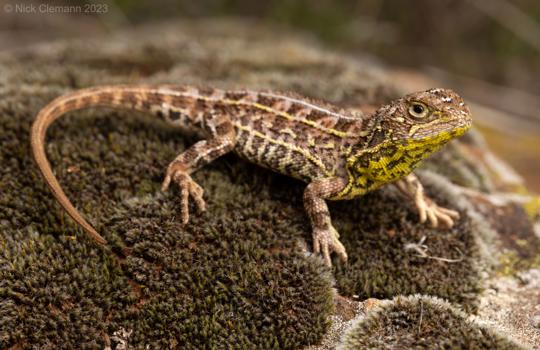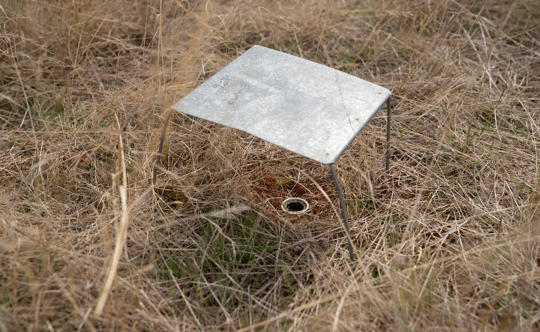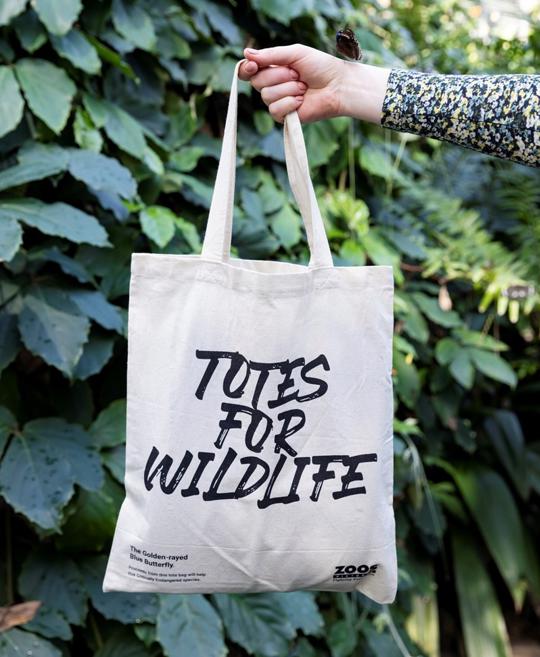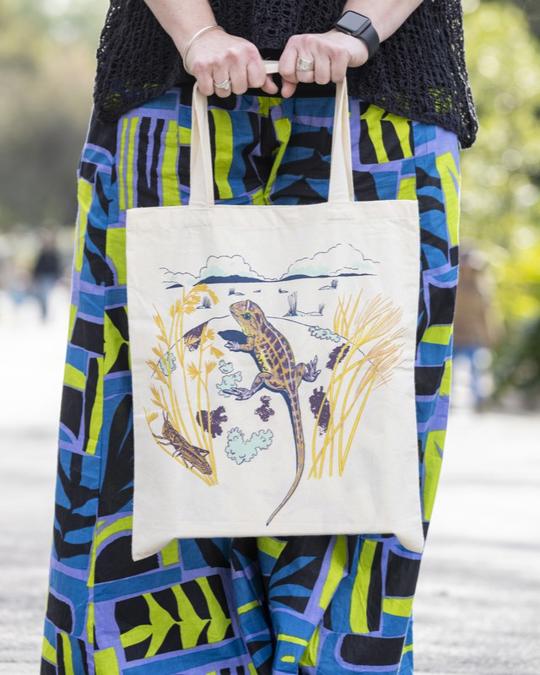Totes for Wildlife
Buy a tote bag and directly support the conservation of local threatened species. With your help, we’ve got conservation in the bag!
Totes for Wildlife highlights a local threatened species each year and, through the sale of exclusively designed tote bags, raises funds for the vital conservation projects we and our partners undertake to protect them.
This year we need your help to support a recently rediscovered local legend and one of the most threatened species in the world, the Victorian Grassland Earless Dragon (Tympanocryptis pinguicolla).
The Victorian Grassland Earless Dragon
After 54 years of no records despite dedicated searches, the Critically Endangered Victorian Grassland Earless Dragon was rediscovered in western Victoria in January 2023.
Historically, this dragon was common and lived in grasslands spanning from Melbourne to Gisborne to Geelong. Now, there is only one known wild population left.
The Victorian Grassland Earless Dragon is part of the dragon reptile family (Agamidae) along with Bearded Dragons, Frilled-Neck Lizards, and Thorny Devils. This dragon is just 15cm long, with three thin white stripes running down their body, and several darker bands running across. These little dragons use rocks and spider burrows for shelter in the wild.
Victorian Grassland Earless Dragons are threatened by habitat loss due to urban growth, changing climate and introduced plant and animal species. As their name suggests, the dragons are reliant on grassland habitat, which is critically endangered in Victoria, with less than 1% remaining.
Our staff are on the frontline of delivering a world-first conservation breeding program at Melbourne Zoo, but we still have lots to learn about this dragon in the wild.

Photographed by Nick Clemman

The sale of every Totes for Wildlife bag will help us discover more about wild dragons and how they use the environment.
With their recent rediscovery, scientists must now discover more about the Victorian Grassland Earless Dragon so we can unlock how to support their long-term future.
In the wild, the dragons use Wolf spider burrows for shelter. Our specialist keepers and scientists use artificial spider tubes (or “dragon dens”) to replicate these burrows to shelter dragons in our care and help find dragons in the wild. These specially-made burrows assist our scientists in monitoring the known wild population, teaching us more about dragons and their population and habitat needs. They also provide a tool to seek out dragons that may remain in other areas!
Funding raised by Totes for Wildlife will go towards installing more dragon dens in the field, and using surveying technologies such as radio-tracking, remote monitoring and genetic testing. This equipment will support monitoring the rediscovered dragons, exploring areas where other populations could persist, and identifying possible release sites for the future.
Be part of this extraordinary second chance to save this species from extinction.


You buy a tote,
We discover more about wild dragons.
Together we help save a species.
How has Totes for Wildlife helped threatened species so far?
Since 2019, more than 60,000 Totes for Wildlife bags have been purchased. Thanks to everyone who bought a tote bag and our conservation partners, this has resulted in:
- 15,000 plants being planted within Yellingbo Nature Conservation Reserve to the east of greater Melbourne to improve and increase available habitat for Helmeted Honeyeaters.
- Over 6,000 Mountain plum pines and other alpine food plants planted in Mountain Pygmy-possum habitat here in alpine Victoria, and habitat improvement works and planting in alpine areas of New South Wales to help the Mountain Pygmy-possum recovery after the Black Summer bushfires.
- 35 Hectares of land to be protected for the Plains-wanderer through a conservation covenant in northern Victoria to maintain as habitat for this unique bird species, forever.
- Planting of Thousands of Creeping Boobiala plants in the Wimmera region of Victoria, providing important food and habitat for the Golden-rayed Blue butterfly.
Want to do more? Continue to support the Victorian Grassland Earless Dragon by making a tax-deductible donation today.
Zoos Victoria is committed to Fighting Extinction. We work within our zoos and in wild habitats, collaboratively with recovery teams and partner organisations, to ensure the survival of local threatened species.

